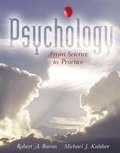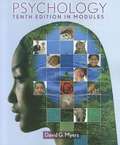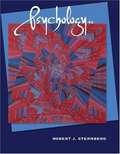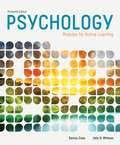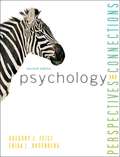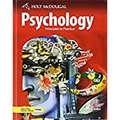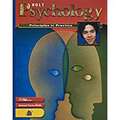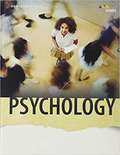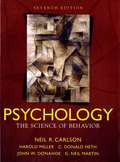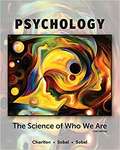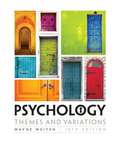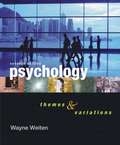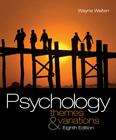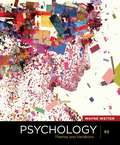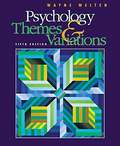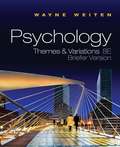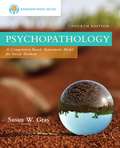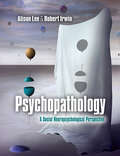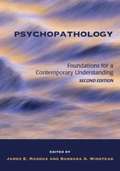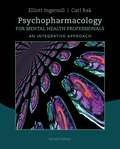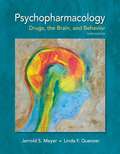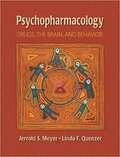- Table View
- List View
Psychology: From Science to Practice
by Robert A. Baron Michael J. KalsherWith a strong emphasis on application-- without neglecting research and science-- this text focuses on helping students use the findings and knowledge of psychology in their own lives and careers. As the only introductory psychology text written by authors with extensive business experience, this book seeks the ideal balance between psychology' s "practical "and "scientific "sides. It highlights psychology' s scientific nature while simultaneously emphasizing its practical value-- how students can actually use and apply the material they read on the job and outside of the classroom. "Psychology: From Science to Practice" emphasizes three key goals: Make it clear to students how they can actually use the findings and knowledge of psychology in their own lives and careers. Present psychology as a science. Discuss the major findings of psychology without overwhelming students with too much detail.
Psychology: In Modules (Tenth Edition)
by David G. MyersThis modules-based version of Myers' Psychology tenth edition breaks down the book's 16 chapters into 54 short modules. The condensed text allows students to better grasp and explore psychological concepts. It also makes for more flexibility in teaching, as cross-references to other chapters have been replaced with brief explanations.
Psychology: In Search of the Human Mind (4th Edition)
by Robert J. SternbergSternberg (psychology, Yale University) emphasizes the theme of unity in psychological sciences in this fourth edition. This edition has been edited for readability and interest, and includes new boxed features on how psychologists from different disciplines would treat the same condition. Also new are expanded quizzes, critical thinking questions, and chapter summaries. The CD- ROM contains animations, activities, and videos. Annotation (c)2003 Book News, Inc., Portland, OR (booknews.com)
Psychology: Modules For Active Learning, Thirteenth Edition
by Dennis Coon John O. MittererPSYCHOLOGY: MODULES FOR ACTIVE LEARNING combines the highly effective SQ4R (Survey, Question, Read, Recite, Reflect, Review) active learning system, an engaging style, appealing visuals, and detailed coverage of core topics and cutting-edge research in one remarkable, comprehensive text. Fully updated, the thirteenth edition of this best-selling book includes new and revised content, extensive special features, and integrated learning tools. While the book provides a thorough introduction to the study of psychology, its modular design and emphasis on how psychology relates to everyday life make it easy for readers to explore, enjoy, and ultimately master a wide variety of topics.
Psychology: Perspectives and Connections (2nd Edition)
by Gregory Feist Erika RosenbergIn psychology, not everything is black and white. "Psychology: Perspectives & Connections 2e " dares students to challenge their own assumptions, explore research and to not believe everything they think. The over-riding goal of "Psychology: Perspectives & Connections 2e " is to align what excites us as researchers and perpetual students of psychology with todays introductory psychology student. Feist and Rosenbergs aim is to help students understand that psychology, and much of the world around them, is more fascinating--and likely more intricate and interdependent-- than they think. Its not just black and white. And, with Connect Psychology and its adaptive learning system, students can better understand what they know and master what they dont know. Connect with science. Connect with students. Connect with Feist and Rosenbergs "Psychology 2e. "
Psychology: Principles in Practice
by Spencer A. RathusNever HIGHLIGHT a Book Again! Virtually all testable terms, concepts, persons, places, and events are included.look no further for study resources or reference material. Cram101 Textbook Outlines gives all of the outlines, highlights, notes, and practice-tests for your textbook. Only Cram101 is Textbook Specific. Cram101 is NOT the Textbook.
Psychology: Principles in Practice
by Spencer A. RathusEvery day, psychologists study a fascinating topic--people. Why do they do this? To learn why people act and think the way they do.
Psychology: Principles in Practice
by Spencer A. RathusOne needs to develop a variety of critical thinking skills to fully grasp the range of concepts and methods used in the study of psychology and this book guides one to achieve that.
Psychology: Principles in Practice
by Spencer RathusPsychology: Principles in Practice by Spencer Rathus.
Psychology: The Science of Behavior (7th edition)
by Neil R. Carlson Harold Miller C. Donald Heth John W. Donahoe G. Neil MartinThis, a rigorous biological and evolutionary approach to introductory psychology text, presents psychological behavior in the context of its adaptive significance. The Seventh Edition combines a scholarly survey of research with real-world applications of research results to problems that confront us today. The authors apply the discovery method to take students inside the research process to foster a critical understanding of the logic and significance of empirical findings.
Psychology: The Science of Who We Are
by Fountainhead PressPsychology: The Science of Who We Are presents an overview of the major ideas and themes of modern psychology studied in introductory and general psychology courses. With an emphasis on real-life applications of psychological theories and concepts, Shawn Charlton, Susan Sobel, and Ken Sobel offer not only the structure and history of psychology but also explain such concepts through relatable examples and common experiences. As students study this text, they will learn about the tools of modern psychology, the role of biological systems in shaping behavior, how the brain makes sense of the world, how they change and mature throughout their lifespans, how behavior affects their understanding of their environments, what creates personality, the differences between thinking and intelligence, what defines normal and abnormal behaviors, how to treat abnormal behaviors, and the dynamics of social environments. Students studying this text will build a foundation for further studies in psychology and for better understanding themselves and others.
Psychology: Themes and Variations
by Wayne WeitenA more concise version of the introductory psychology text offering thorough coverage of the major theories (and controversies) in the field today. The focus is on ideas rather than facts, integrating research and application in the areas of biological behavior concepts, sensation and perception, consciousness, conditioning, memory, language and thought, intelligence and psychological testing, emotion, human development, personality theory, stress, psychological disorders, psychotherapy, and social behavior. Includes very jazzy color photographs and illustrations. Paper edition (unseen), $48.75. Annotation c. by Book News, Inc., Portland, Or.
Psychology: Themes and Variations
by Wayne WeitenA more concise version of the introductory psychology text offering thorough coverage of the major theories (and controversies) in the field today. The focus is on ideas rather than facts, integrating research and application in the areas of biological behavior concepts, sensation and perception, consciousness, conditioning, memory, language and thought, intelligence and psychological testing, emotion, human development, personality theory, stress, psychological disorders, psychotherapy, and social behavior. Includes very jazzy color photographs and illustrations. Paper edition (unseen), $48. 75. Annotation c. by Book News, Inc. , Portland, Or.
Psychology: Themes and Variations
by Wayne WeitenBiological bases of behaviour - Sensation and perception - Sleep and dreams - Learning through conditioning - Human memory - Language and thought - Intelligence and testing - Motivation and emotion - Human development across the life span - Personality - Coping and stress management - Suicide - Psychological disorders - Psychotheraphy - Social behaviour - Split brain research (Gazzaniga, Bogen & Roger Sperry)
Psychology: Themes and Variations (5th Edition)
by Wayne WeitenFilled with exciting, current research findings, this affordable CENGAGE ADVANTAGE BOOKS version of PSYCHOLOGY: THEMES AND VARIATIONS shows you the many ways that psychology applies to your life today and every day! In the book's "Featured Studies," you'll get a bird's eye view of real psychological research in action. "Critical Thinking Applications" give you specific critical thinking tools that you can use to help you think analytically and critically about what you read. Weiten also helps you excel in the psychology course by including overarching concepts--weaving these concepts throughout the book to help you see how the topics and research you are studying fit together into one understandable picture called psychology! Every chapter offers tools to help you focus on what's important--showing you how to study in ways that help you retain information and do your very best on exams.
Psychology: Themes and Variations (8th Edition)
by Wayne WeitenIn PSYCHOLOGY: THEMES AND VARIATIONS, BRIEFER VERSION, Wayne Weiten continues his proven combination of a scientifically rigorous text with selective pedagogy that makes learning easy for students. Weiten's approach is backed by a straightforward writing style, unparalleled in-text visuals and didactic art program, and in-book review to help users prioritize and retain the core concepts. Weiten surveys psychology's broad range of content with three aims: to illuminate the process of research and its intrinsic relationship to application (themes); to show both the unity and diversity of the subject (variations), and to invite users to the study of psychology by respecting their ability to master its fundamental concepts. Weiten's themes (including empiricism, theoretical diversity, sociohistorical contexts, multifactorial causation, cultural heritage, heredity and environment, and subjectivity of experience) and variations provide unifying threads across chapters that help users see the connections among different research areas in psychology.
Psychology: Themes and Variations (Seventh Edition)
by Wayne WeitenThe Seventh Edition of Wayne Weiten's popular text, Psychology: Themes and Variations, continues to offer students a unique survey of psychology with three distinct goals: to show both the unity and diversity of psychology's subject matter; to illuminate the process of research and its intimate link to application, and to make the text challenging to think about and easy to learn from.
Psychopathology: A Competency-Based Assessment Model for Social Workers (Empowerment Series)
by Susan GrayWritten by a practicing social worker, PSYCHOPATHOLOGY offers a compelling look at the current state of knowledge about mental disorders. The authors' accessible narrative blends with detailed, realistic vignettes to give you an inside look at what it means to practice psychopathology today. Part of the Cengage Empowerment Series, the fourth edition is completely up to date and thoroughly integrates the new DSM-V. It also integrates the core competencies and recommended practice behaviors outlined in the 2008 Educational Policy and Accreditation Standards (EPAS) set by the Council on Social Work Education (CSWE).
Psychopathology: A Social Neuropsychological Perspective
by Robert Irwin Alison LeeIn Psychopathology: A Social Neuropsychological Perspective, Lee and Irwin demonstrate that mental distress often defies traditional forms of medical classification. Integrating both psychosocial and neuropsychological frameworks, they present a unique and balanced perspective on psychopathology, emphasising the importance of context, relationships and neuroplasticity. Written to support teaching and learning at the undergraduate level, Psychopathology: A Social Neuropsychological Perspective encourages students to explore alternatives to traditional diagnostic models. <P><P>Pedagogical features such as reflection points in each chapter encourage critical engagement and classroom debate. The result is an original examination of mental distress and a stand-alone resource for students in this area.<P> Questions the validity of the dominant diagnostic framework of psychopathology (grounded in the Diagnostic and Statistical Manual of Mental Disorders and the International Classification of Diseases)<P> Presents a variety of perspectives on mental distress, emphasising the importance of context, relationships and neuropsychological processes.<P> Encourages critical engagement through pedagogical features such as reflection points in each chapter, and provides a balanced discussion of issues from differing perspectives and authors, supporting classroom debate.<P> Fills a much-needed gap in the market for instructors who do not want to base their class on the DSM/ICD approach to abnormal psychology.
Psychopathology: Foundations for a Contemporary Understanding (2nd Edition)
by Barbara A. Winstead James E. MadduxPsychopathology is intended for first-year graduate students in clinical psychology, counseling psychology, and related fields, and it has been specifically designed to meet the needs of students in these courses. Maddux and Winstead have brought together the most distinguished researchers in the fields of clinical psychology and psychopathology in order to provide up-to-date information about theory and research, as well as to challenge students to think critically about psychopathology. Thoroughly revised and updated from the previous edition, the book focuses throughout on what has been demonstrated by research, not on what has been claimed by theories that may be accepted or traditional but lack empirical support. The first section presents and analyzes the basic concepts we need to understand any disorder; the second examines the disorders most frequently encountered in clinical practice.
Psychopharmacology for Mental Health Professionals: An Integrative Approach (2nd Edition)
by R. Elliott Ingersoll Carl F. RakThis book is an introductory level text on psycho-pharmacology for students preparing for careers in psychology, counselling, and social work.
Psychopharmacology: Drugs, The Brain, And Behavior
by Jerrold Meyer Linda QuenzerUnique in its breadth of coverage ranging from historical accounts of drug use to clinical and preclinical behavioral studies, Psychopharmacology is appropriate for undergraduates studying the relationships between the behavioral effects of psychoactive drugs and their mechanisms of action.
Psychopharmacology: Drugs, the Brain, and Behaviors (2nd Edition)
by Richard A. Harvey Michelle A. Clark Richard Finkel Jose A. Rey Karen WhalenRecent advances in molecular pharmacology and brain imaging have revolutionized our understanding of how psychoactive drugs work. Now, from the authors of Principles of Neuropsychopharmacology, comes a new undergraduate textbook integrating these developments. The first section of the book provides extensive foundation materials, including the basic principles of pharmacology, neurophysiology and neuroanatomy, synaptic transmission, and methods in psychopharmacology. The second section describes key features of major neurotransmitter systems, including the catecholamines, serotonin, acetylcholine, glutamate and GABA. The third and fourth sections discuss theories and mechanisms of drug addiction and psychopathology. All major substances of abuse as well as drugs used to treat mental illness are covered. Psychopharmacology: Drugs, the Brain and Behavior is unique in its breadth of coverage, ranging from historical accounts of drug use to clinical and preclinical behavioral studies to the latest research on drug effects in transgenic mouse models. Student engagement with the material is fostered by opening each chapter with a relevant vignette and by providing breakout boxes presenting novel or cutting-edge topics for special discussion. The book is extensively illustrated with full-color photographs and line art depicting important concepts and experimental data. Psychopharmacology: Drugs, the Brain and Behavior is appropriate for undergraduate psychopharmacology or drugs and behavior courses that emphasize relationships between the behavioral effects of psychoactive drugs and their mechanisms of action.
